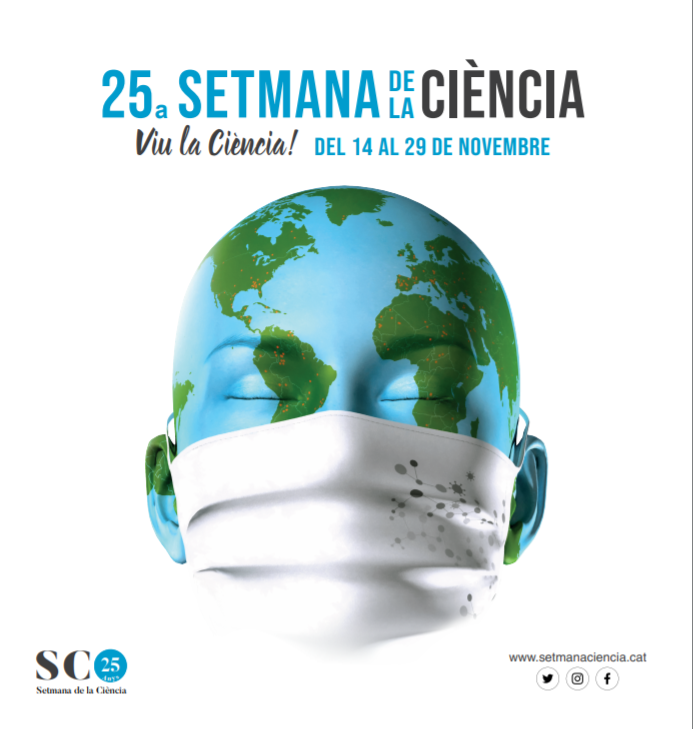IEEC participates in the Science Week 2020 in Catalonia
2020-11-17 14:30:00

Since last 14 November 2020 and until next 29th of this month, the 25th edition of the Science Week in Catalonia (Setmana de la Ciència – SC'20) is held.
The Science Week – promoted by Fundació Catalana per la Recerca i la Innovació (FCRI) with the support of the Secretariat for Universities and Research of the Department of Business and Knowledge (Departament d'Empresa i Coneixement), and the collaboration of Fundació “La Caixa”, Amgen, BBVA and BASF– celebrates this year its quarter of a century bringing science and technology closer to society.
This initiative has carried out, since its inception, a bunch of scientific dissemination activities, such as open days, exhibitions, talks, games and scientific workshops throughout the territory. Given the current situation, the program of activities has been adapted to the health crisis, with most of the activities being done in virtual support.
One more year, the Institute of Space Studies of Catalonia (IEEC — Institut d’Estudis Espacials de Catalunya) participates in the Science Week by organizing several online talks and virtual visits in research centers.
You will find the calendar and information about each of the activities below:
Wednesday 18 November, 5:00 pm: Kike Herrero, support and operations astronomer at the Montsec Astronomical Observatory (OAdM).
Virtual Visit to the Montsec Astronomical Observatory
Wednesday 18 November, 8:00 pm: Josep Maria Trigo, astrophysicist and researcher at the Institute of Space Sciences (ICE, CSIC).
Evolution of the atmosphere and climate change
Thursday 19 November, 5:00 p.m.: Francesc Gòdia, professor of Chemical Engineering at the School of Engineering of Universitat Autònoma de Barcelona (UAB)
Virtual visit to the MELiSSA Pilot Plant: development of technologies enabling long-term manned missions in Space
Thursday 19 November, 6:00 pm: Mar Mezcua, researcher at the Institute of Space Sciences (ICE, CSIC).
Supermassive black holes: the most powerful motors of the Univers
Thursday 26 November, 7:00 p.m.: Carme Jordi, professor in the Department of Quantum Physics and Astrophysics at the Institute of Cosmos Sciences (ICCUB).
GAIA: revealing the history of the milky way by measuring 2 billion stars (First talk of the Women4Space conference cycle)
All activities will be held in Catalan, except the talk given by professor Carme Jordi.
This year's edition focuses on the exceptional situation experienced due to the COVID-19 pandemic and this disease, its global evolution and the state of research on the SARS-CoV-2 coronavirus. However, other central themes that SC'20 will focus on are, on the one hand, the UNESCO International Year of Plant Health 2020 and, on the other hand, the centenary of the birth of different scholars and scientists who have stood out in their different fields of knowledge. The scientific figures honored this year are the meteorologist, astronomer and seismologist Eduard Fontserè i Riba, due to the 150th anniversary of his birth; the philologist and linguist Antoni Maria Badia i Margarit; the chemist Enric Casassas i Simó; the English chemist, Rosalind Franklin, key in the discovery of DNA and the writer and biochemist Isaac Asimov.
The Science Week – promoted by Fundació Catalana per la Recerca i la Innovació (FCRI) with the support of the Secretariat for Universities and Research of the Department of Business and Knowledge (Departament d'Empresa i Coneixement), and the collaboration of Fundació “La Caixa”, Amgen, BBVA and BASF– celebrates this year its quarter of a century bringing science and technology closer to society.
This initiative has carried out, since its inception, a bunch of scientific dissemination activities, such as open days, exhibitions, talks, games and scientific workshops throughout the territory. Given the current situation, the program of activities has been adapted to the health crisis, with most of the activities being done in virtual support.
One more year, the Institute of Space Studies of Catalonia (IEEC — Institut d’Estudis Espacials de Catalunya) participates in the Science Week by organizing several online talks and virtual visits in research centers.
You will find the calendar and information about each of the activities below:
Wednesday 18 November, 5:00 pm: Kike Herrero, support and operations astronomer at the Montsec Astronomical Observatory (OAdM).
Virtual Visit to the Montsec Astronomical Observatory
Wednesday 18 November, 8:00 pm: Josep Maria Trigo, astrophysicist and researcher at the Institute of Space Sciences (ICE, CSIC).
Evolution of the atmosphere and climate change
Thursday 19 November, 5:00 p.m.: Francesc Gòdia, professor of Chemical Engineering at the School of Engineering of Universitat Autònoma de Barcelona (UAB)
Virtual visit to the MELiSSA Pilot Plant: development of technologies enabling long-term manned missions in Space
Thursday 19 November, 6:00 pm: Mar Mezcua, researcher at the Institute of Space Sciences (ICE, CSIC).
Supermassive black holes: the most powerful motors of the Univers
Thursday 26 November, 7:00 p.m.: Carme Jordi, professor in the Department of Quantum Physics and Astrophysics at the Institute of Cosmos Sciences (ICCUB).
GAIA: revealing the history of the milky way by measuring 2 billion stars (First talk of the Women4Space conference cycle)
All activities will be held in Catalan, except the talk given by professor Carme Jordi.
This year's edition focuses on the exceptional situation experienced due to the COVID-19 pandemic and this disease, its global evolution and the state of research on the SARS-CoV-2 coronavirus. However, other central themes that SC'20 will focus on are, on the one hand, the UNESCO International Year of Plant Health 2020 and, on the other hand, the centenary of the birth of different scholars and scientists who have stood out in their different fields of knowledge. The scientific figures honored this year are the meteorologist, astronomer and seismologist Eduard Fontserè i Riba, due to the 150th anniversary of his birth; the philologist and linguist Antoni Maria Badia i Margarit; the chemist Enric Casassas i Simó; the English chemist, Rosalind Franklin, key in the discovery of DNA and the writer and biochemist Isaac Asimov.
